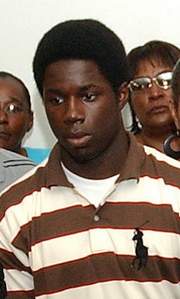 Injunctive Relief Needed in present court systems | Failed Justice | Louisiana Appellate Project | '08 La. Legis. House Concurrent Study Resolution [HCSR-1] approved - no action taken
Injunctive Relief Needed in present court systems | Failed Justice | Louisiana Appellate Project | '08 La. Legis. House Concurrent Study Resolution [HCSR-1] approved - no action taken[ JP resigns] Several accounts have been made relating to a justice of the peace in south Louisiana. Some who retold the story state the JP denied a marriage license to the couple. Not true.
The state official refused to perform the ceremony. The two individuals have now filed suit for civil rights violations in the federal courts. Great.
This could be a perfect storm to make the state's highest court do it's job. In forcing the high court to act, it could very well alter the face of the system, finally. The new chief justice, has a few things to prove in her role. The civil rights suit has nothing to do with actions of the judiciary commission. The commission, is already however wanting to get around it's efficacy. A spokesperson from the judicial administrators office told a national news outlet, the process could take as much as a year. However, the chairman of the commission can cause the body to act, sooner than later if it so desires.
The commission's legal counsel, should already have begun compiling her information to present to the commission, on how the JP's defense may seek to defend him. Truly, the inner workings of the process is hard to unravel. Within the process, the commission's legal counsel will advise the commission on the possible routes the JP's defense may take. The office of disciplinary counsel will make the formal accusatory declaration to the JP. That person is the interim special counsel.
The former special counsel left the commission last year. In 1994, he went to work for the judiciary commission where his primary responsibility was to investigate complaints against judges and hand recommendations for discipline to the commission, a panel of three citizens, three judges and three lawyers appointed by the state Supreme Court. Once the commission settles on a sanction, it's the special counsel's job to persuade the justices to adopt the recommendation.
If, in the function of his office, a state official violates the law it is malfeasance. If, under the color of law an official violates the law and denies a person civil rights the public integrity section of the justice department can pursue criminal charges.
The Public Integrity Section oversees the federal effort to combat corruption through the prosecution of elected and appointed public officials at all levels of government. The Section has exclusive jurisdiction over allegations of criminal misconduct on the part of federal judges and also monitors the investigation and prosecution of election and conflict of interest crimes. Section attorneys prosecute selected cases against federal, state, and local officials, and are available as a source of advice and expertise to other prosecutors and investigators. Since 1978, the Section has supervised the administration of the Independent Counsel provisions of the Ethics in Government Act.
And what if prior state attorney's general were indeed aware of a JP's violative interpretation of their elected office? Who is now liable? The State? Is the state in need of expertise and advice from federal sources? Recusals of local US Attorneys are also a part of the public integrity sections operation. Would the state supreme court be found deficient? Would other areas of the state's judicial apparatus be subject to purview? Perhaps.
On, another note; the state's director of indigent defense, functioning under Act 307 passed by the 2007 regular session has admitted to media the system is broken. The Judiciary has the role of making sure proper judicial process is carried forth. Indigent defendants are routinely wrongly convicted through ineffective assistance of counsel. Is it unimaginable, the mere refusal to honor an officially obtained license from a clerk of court could evolve in to a full scale re-aligning of the system?
The Special Litigation Section of the Civil Rights Division of the US Department of Justice, recently finished an investigation into the Orleans Parish Prison. Released 9-11-09 it outlined deficiencies with the facilities operation. The final paragraph says in part - "We are obligated to advise you that, in the event that we are unable to reach a resolution regarding our concerns, the Attorney General may initiate a lawsuit pursuant to CRlP A to correct deficiencies of the kind identified in this letter"... .. .. .. . . .









